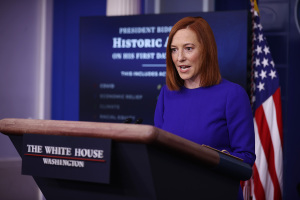'God Is Dead' Theologian William Hamilton Dies at 87
"God is Dead" theologian William Hamilton died on Tuesday of complications from congestive heart failure in Portland, Ore., according to The Associated Press. He was 87.
The radical theologian was a leading figure in the controversial Death of God movement during the 1960s, which was brought to national fame in 1966 when Time magazine published the infamous cover story "Is God Dead?"
John T. Elson, the religion editor behind the best-selling Time cover, called the new movement a "theology without theos," a belief that God was dead and that humans needed to press on without Him.
"The death of God is a metaphor," Hamilton said as quoted by The Oregonian. "We [need] to redefine Christianity as a possibility without the presence of God."
Despite God's absence in the world, however, Jesus remained a crucial figure whom humans should seek to imitate.
"In his baptism, his teaching, his healings, his passion, death and resurrection – in all of it, there is a demand laid on us, or an offer tendered, and it is the task of the Christian to embody that offer in his world, being as candid as he can about the difference between Jesus' beliefs and his," the former theology professor at Colgate Rochester Divinity School wrote.
Hamilton was not the only theologian who rejected the existence of God while embracing Jesus. He and Paul Van Buren, an ordained Episcopalian priest and professor of religion at Temple University, both offered Christ as the model human whose teachings should be adopted and followed.
Other leading figures such as Thomas J. J. Altizer, who co-wrote Radical Theology and the Death of God with Hamilton and Gabriel Vahanian, were also major proponents of the Death of God movement, which sought to construct a post-theistic theology without the existence of an omnipotent God.
According to the Christian Century, Altizer once called Hamilton "the most articulate leader of the death of God movement in America."
"[He was] the first theologian to break through the barriers of Protestant neo-orthodoxy to formulate a theological acceptance of the death of God [by] entering into an open dialogue with modern culture," he added.
Before he championed the contentious movement, Hamilton was a "very bland, very liberal, Yale Divinity School pastor," as he described himself. He grew up in a Baptist, suburban, middle-class parish, served in the Navy during World War II, and thereafter studied theology at Union Theological Seminary and the University of St. Andrew's in Scotland, earning a doctorate in theology.
He was appointed to the faculty of Colgate Rochester Divinity School upon graduating and became the school's chair of historical theology, hailed as one of the up and coming American theologians.
Then something happened.
Hamilton began reflecting on his faith, on God and pretty soon he no longer saw an active God. God had died.
His doubts about God did not materialize overnight, however, The Oregonian revealed. They had in fact been forming for a long time, ever since he was 14 years old. During that period, he witnessed an accident that left him questioning God's goodness.
His friends had been building pipe bombs one day when it exploded, leaving his two Episcopalian and Catholic friends dead. But his other friend, a son of an atheist, was left alive without a scratch on his body.
He began wondering about the omnipotence of God from that day on, questioning why a just God would allow things like that to happen.
His questions never ceased during his years of formal education in theology and eventually led to his belief that God was dead. He stopped attending church, though he did continue to teach his children about Jesus and the Bible.
With his sudden but not-so-sudden turnaround in faith, many began to criticize him, with much of the public responding in hostility.
He received death threats, was ostracized by friends and colleagues, and his endowed chair at the divinity school was eventually taken away as a result.
Hamilton eventually left Colgate to teach religion at New College in Sarasota, Fla., and after a few years moved on to Oregon to teach at Portland State University.
Though the Death of God movement did not survive the 60s, the former veteran continued to stand by his own theories. He also never went back to church.
And despite his "radical" beliefs about God, he encouraged people to live by Jesus' words and teachings.
"The death of God enabled me to understand the world," Hamilton told The Oregonian. "Looking back, I wouldn't have gone any other direction. I faced all my worries and questions about death long ago."




























